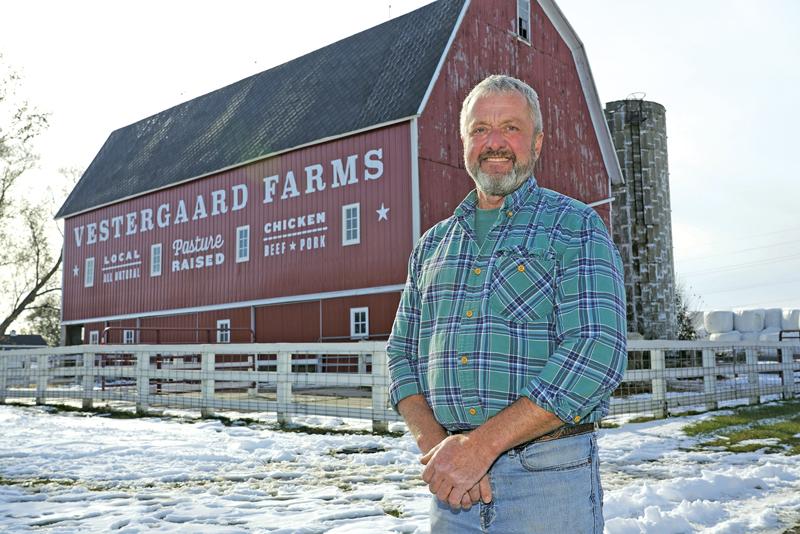For the last ten years, Mike Vestergaard has been raising livestock on Wagner Rd. southwest of town. Now he’s opening an on-site retail outlet, also called Vestergaard Farms.
In the newly built, red-barn-inspired shop, customers can buy frozen whole chickens, cuts of beef, and pork products like ham and bacon, all from animals raised on the farm’s 152 acres.
The beef comes from Belted Galloway cows, a breed that stands out for both their distinctive large middle stripe and their resistance to the cold. “The reason why I went with them quite a few years ago is that they’re really hearty,” he says. “They thrive and gain weight even in these cold temperatures,” leading to desirable fat-marbled meat. This year, Vestergaard produced 100 cows, 1,000 chickens, and twenty-five hogs, and next year he’s aiming for even more.
Vestergaard grew up on a small farm in Denmark, where he later received a master’s degree in dairy farming. He and his former wife moved to Ann Arbor in 1992, when she was accepted to graduate school at the U-M.
He’d always dreamed of starting a dairy farm but quickly realized it wasn’t financially feasible.
“We looked into a few farms and made some budgets for them and figured out there was no way we were going to make it,” he says. Instead, he started a playground installation company that he now runs with his sons, Max and Carsten.
In 2010, Vestergaard purchased the Wagner Rd. farm. It’s part of the Ann Arbor Greenbelt, an initiative to preserve rural land near the city. Through the program, landowners agree to sell all or some of their development rights for cash and future tax benefits. In exchange they accept a permanent deed restriction that limits the development of housing or businesses on the land. Vestergaard is grateful: he says he would not have been able to afford the farm without the program.
Vestergaard is also invested in the idea of ethical farming. He is committed to paying a living wage to his farm’s small number of employees, and he says he does not use any pesticides or chemicals in the pastures where he grows his animals’ feed. But they’re not certified organic.
“My cows are all grass-fed,” he says. “They are raised out on the pasture.” But “if I want to be certified organic, the bedding straw has to come from an organic field, which doesn’t make any sense to me. That bedding straw will cost me three times as much as if I go up to the neighboring farm and say ‘Hey, let me buy some straw off your commercially farmed field’ … If [the cows] are getting high quality hay [to eat] from my hayfield, it is as organic as you can be.”
Vestergaard also thinks the organic obsession has obscured the larger picture: “It has to do with the carbon footprint,” he says. “Why are we buying beef that comes from California?”
“My whole vision with this store is to produce all the chicken, pork, and beef that I can on this farm, but I will support any other farmer.” He is seeking out a vegetable farmer and any other local producers interested in supplying his store. He will also offer coffee and baked goods from Zingerman’s, milk and cheese from nearby Calder Dairy, and donuts from the Washtenaw Dairy.
Vestergaard Farms (opening Dec. 2), 4408 S. Wagner Rd. (734) 939-2875. Daily 7 a.m.-7 p.m.. vestergaardfarms.com
